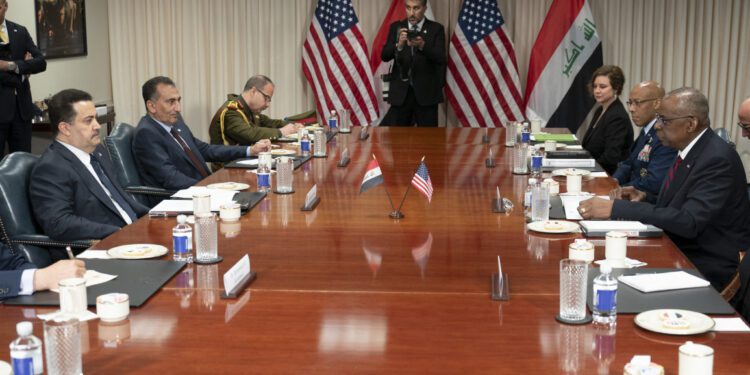On July 22, 2024, the Biden administration resumed pivotal negotiations with a senior Iraqi delegation in Washington, focusing on the future of the approximately 2,500 U.S. troops currently stationed in Iraq. These talks, conducted at the Pentagon, are crucial for determining the trajectory of U.S. military involvement in the region amid evolving political and security dynamics.

Context of the Talks
The negotiations build on a yearlong joint review of Iraq’s military capabilities and the strategic role of U.S. forces in the country. The talks are spearheaded by Iraqi Defense Minister Thabet Muhammad al-Abbasi, with U.S. representatives from the National Security Council, State Department, U.S. Central Command (CENTCOM), and the Pentagon’s Joint Staff in attendance.
Objectives of the Talks
- Establishing a Timeline: One of the central objectives is to establish a timeline for transitioning the current U.S. advisory troop presence to a more “normal” bilateral defense relationship. This transition could involve either the gradual withdrawal of U.S. troops or the rebranding of their mission under a new partnership arrangement.
- Redefining Security Relations: The talks aim to redefine U.S.-Iraq security relations for the next decade. This includes assessing how the U.S. military’s role can evolve to better align with Iraq’s current needs and strategic goals.
- Addressing Regional Tensions: The negotiations will also consider the broader implications of U.S.-Iran relations and regional security issues. Iranian-backed militias in Iraq have increased their attacks on U.S. forces and commercial shipping, partly in response to the ongoing conflict between Israel and Hamas.
Current Challenges
The backdrop of these discussions includes significant regional tensions. The war in Gaza has intensified anti-American sentiment in the Middle East due to U.S. support for Israel, exacerbating the political pressure on Iraqi Prime Minister Mohamed Shia al-Sudani. Al-Sudani, who is seeking a second term, faces considerable pressure from Iran-backed factions demanding the expulsion of U.S. troops.
In addition, Iranian-armed militias have launched attacks on U.S. forces and commercial interests, further complicating the security landscape. The U.S. has responded to these threats with targeted strikes and sanctions, contributing to a volatile environment in which these negotiations are taking place.
Historical Context
The current round of talks follows a year of joint reviews initiated in August 2023, assessing Iraq’s military capabilities and the role of U.S. forces after the defeat of the Islamic State (ISIS). During a visit to Washington in April, Prime Minister al-Sudani and President Joe Biden agreed to review and transition the mission of the global coalition in Iraq. This agreement set the stage for the current negotiations, which seek to formalize the transition and address the evolving security needs of Iraq.
Expected Outcomes
The outcomes of these talks could significantly impact U.S. military engagement in Iraq and broader diplomatic strategies in the Middle East. The potential shift in the U.S. military presence could affect regional stability and U.S. relations with both Iraq and Iran.
As the Biden administration navigates these complex negotiations, the future of U.S. troop presence in Iraq remains uncertain. The talks will be closely watched by regional stakeholders and could have far-reaching implications for U.S. foreign policy and security strategy in the Middle East.
Related stories:
UN Envoy in Iraq to Step Down at End of May, Warns of Tensions Pushing Country to the Brink
Global Reactions to US Airstrikes on Iran-Aligned Targets in Iraq and Syria
Iraq Denounces US Airstrikes, Warns of Consequences Amid Rising Tensions
















